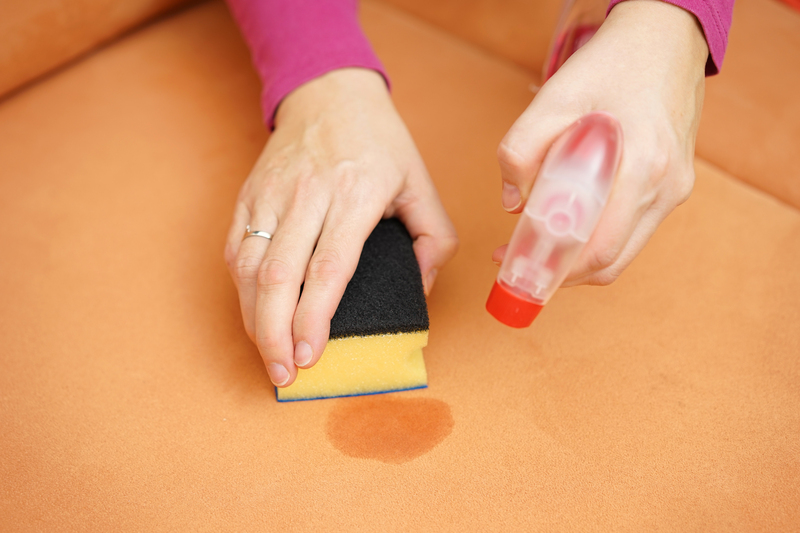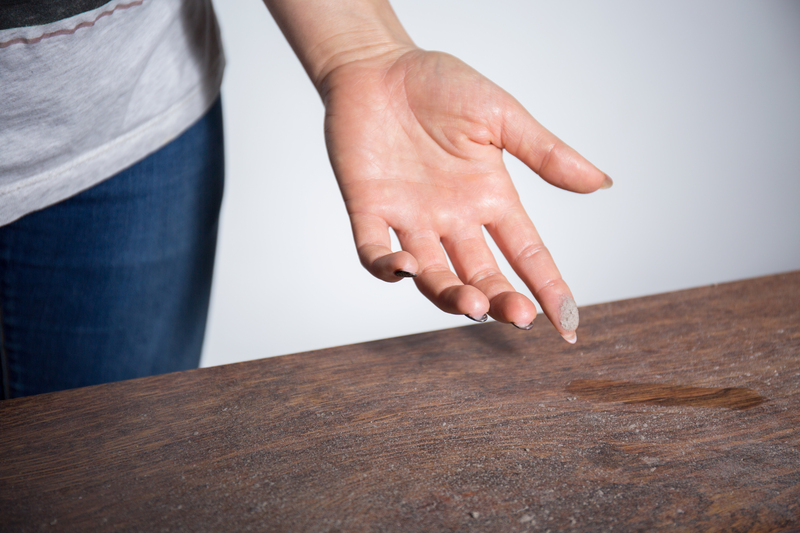Conquer Pet Odors with These Home Solutions
Posted on 25/08/2025
Conquer Pet Odors with These Home Solutions
Pet odors can sometimes make even the cleanest homes feel less inviting. Whether you're dealing with the constant presence of a furry friend or just an occasional guest, the challenge of eradicating stubborn animal smells can be daunting. Fortunately, there are proven home solutions for pet odor removal that don't rely on harsh chemicals or expensive services. This comprehensive guide will provide you with expert tips, natural remedies, and strategies for banishing pet odors from every corner of your home.
Understanding Pet Odors: Why Do They Happen?
To conquer pet odors, it helps to understand exactly what causes them. Animals are living beings with natural oils, fur, and sometimes accidents. Here's why those smells linger:
- Natural oils and dander: Pets produce oils to keep their skin and coat healthy, but these can collect odors over time.
- Accidents: Even the best-trained pets can have the occasional mishap. Urine, vomit, and fecal matter are particularly notorious for leaving lasting smells if not cleaned promptly and thoroughly.
- Saliva and sweat: Dogs, cats, and other pets groom themselves and mark their territory, contributing additional odor sources.
- Trapped fur and hair: Pet hair can trap bacteria, dust, and allergens - all of which contribute to the smell.
Recognizing these sources is the first step to making your home fresher and more pleasant.

The Importance of a Clean Environment
The cornerstone of any successful pet odor removal strategy is a consistent cleaning routine. Not only does it improve your living space's appearance, but it also dramatically reduces the potential for lingering pet smells.
Daily Habits to Keep Pet Odors at Bay
- Vacuum regularly: Use a vacuum with a HEPA filter and pet hair attachment. Focus on corners, under furniture, and areas where your pet spends most of their time.
- Wash bedding and toys: Clean your pet's bedding, blankets, and soft toys weekly in hot water with a gentle detergent.
- Sweep and mop floors: Hard floors collect fur and dander. Mop with a solution of water and vinegar (more on this below!).
- Lint roll surfaces: Use a lint roller on couches, chairs, and curtains to remove hair and dander quickly.
Combining these habits with the right cleaning tools can ensure that pet odors in your home don't stand a chance.
Natural and Homemade Solutions to Combat Pet Smells
There's no need to saturate your home with artificial fragrances or harsh chemicals. In fact, many household products are effective, safer for your pet, and environmentally friendly. Here are the best pet odor elimination solutions you probably already have at home:
Baking Soda: Nature's Odor Absorber
Baking soda is a powerful, natural deodorizer. Its alkaline nature helps to neutralize acidic pet odors, making it a go-to for tackling smelly spots.
- Carpet freshener: Sprinkle baking soda liberally on carpets, let it sit for 30 minutes, then vacuum thoroughly.
- Upholstery treatment: Dust on couches and armchairs, wait, then vacuum away odors.
Tip: To create a pet-safe air freshener, fill a small bowl with baking soda and leave it in a discreet corner of the room.
Vinegar: The Versatile Solution
White vinegar is another household staple that neutralizes odors rather than masking them. Its acidity breaks down the compounds responsible for unpleasant pet smells.
- Pet stain remover: Mix equal parts white vinegar and water in a spray bottle. Spray directly onto stains or smelly surfaces, blot with a towel, and let dry.
- Floor and surface cleaner: Add vinegar to your mop water to cleanse floors while leaving behind a neutral, odor-free scent.
Never use vinegar on natural stone or hardwood finishes without testing in an inconspicuous area first.
Hydrogen Peroxide for Deep Odors
Hydrogen peroxide is especially effective against lingering urine smells on carpets and fabrics. Combine it with baking soda for a one-two punch.
- DIY pet odor remover: Mix one cup hydrogen peroxide, one tablespoon baking soda, and a few drops of mild dish soap. Apply to the affected area, let it bubble, blot, and then rinse with water.
Always spot test hydrogen peroxide, as it may bleach some materials.
Activated Charcoal
Activated charcoal is an advanced solution for chronic pet odors. This porous substance attracts and absorbs lingering smells from the air and fabrics.
- Air freshener bags: Place activated charcoal pouches in closets, by litter boxes, or near pet beds to keep the environment smelling neutral.
Activated charcoal is non-toxic and safe for homes with pets and children.
Combating Odors in Common Problem Areas
The Carpets and Rugs
- Immediate cleanup: For fresh pet stains, blot (do not rub) excess moisture, sprinkle with baking soda, and vacuum once completely dry.
- Deep cleaning: Rent or purchase a carpet cleaner specifically designed for pet households, and use an enzymatic cleaner to break down organic residue.
Regular deep cleaning every few months helps maintain a consistently odor-free home.
Pet Beds and Blankets
- Regular washing: Use hot water and a scent-neutralizing detergent. For tough odors, add a cup of white vinegar to the rinse cycle.
- Sun exposure: Place beds outside on sunny days. The sun's UV rays naturally help kill bacteria and freshen fabrics.
The Litter Box
- Scoop daily: Quickly removing waste is the first line of defense against powerful odors.
- Deep clean weekly: Empty the litter box, scrub with soapy water and vinegar, and let air dry completely before refilling.
- Ventilation: Keep the litter box area well-ventilated and consider an air purifier with a charcoal filter for maximum results.
Pet Accidents on Upholstery
- Blot, don't rub: Gently blot the moisture out, treating with a mixture of water and vinegar or an enzyme-based cleaner.
- Launder removable covers: Machine wash if possible, again using hot water and a dash of vinegar.
Commercial Products for Home Pet Odor Control
Sometimes, DIY solutions are not enough or you need extra help for persistent problems. Here are some effective commercial pet odor removal products:
- Enzymatic cleaners: These products use natural enzymes to break down the molecules causing odors. Brands like Nature's Miracle or Simple Solution are highly recommended by pet owners.
- Odor-eliminating sprays: Look for products labeled as pet-safe and non-toxic, such as Febreze Pet Odor Eliminator.
- HEPA air purifiers: These machines capture dander and airborne odor particles, improving air quality throughout your home.
Detailed Steps to Create a Pet Odor Free Home
Follow these actionable steps to maintain a fresh, odor-free environment:
- Groom your pet regularly. Bathing, brushing, and dental care are essential to minimize the source of unpleasant aromas. Use pet-approved shampoos and wipes between baths.
- Designate a pet area. If possible, keep pets in certain areas of the house (such as non-carpeted rooms) to limit odors from spreading.
- Keep ventilation in mind. Open windows regularly, use ceiling or portable fans, and consider an air purifier for sustainable freshness.
- Replace air filters. Change your furnace and HVAC filters every 1-3 months to prevent dander and hair from recirculating.
- Stay on top of laundry. Wash not only your pet's items, but also your own clothing and linens that may come into contact with pet fur and dander.
- Schedule deep cleans. Even with all the right daily habits, schedule monthly or quarterly deep cleans for carpets, curtains, upholstery, and vents.
Managing Pet Odors by Pet Type
Different pets create different odor challenges. Here's how to handle common pet household odors:
Dogs
- Dry and towel off after walks. Wet dog smell is a common issue after outdoor time in rain or snow. Keep a towel near the entrance to dry your dog before they roam the house.
- Maintain dental hygiene. Dog breath can significantly impact air quality. Brush your dog's teeth regularly or provide dental chews.
Cats
- Multiple litter boxes. If you have more than one cat, provide more than one box per cat to improve cleanliness and reduce odor buildup.
- Litter choice. Opt for clumping, odor-sealing litter for best results, and experiment with natural litters if you're sensitive to chemicals.
Birds, Small Animals, & Reptiles
- Frequent cage cleaning. Small pet enclosures should be cleaned out at least twice a week. Use safe disinfectants and line with odor-absorbing bedding.
- Proper ventilation. Place cages or tanks in areas with good airflow to prevent smells from accumulating.

When to Seek Professional Help for Pet Odors
In some extreme cases, lingering odors may persist despite your best efforts. This can be due to deeply saturated urine in subfloors or years of buildup in HVAC ducts.
- Professional carpet cleaning: Experienced cleaners can use industrial-grade equipment to address odors beyond the reach of household tools.
- Duct and vent cleaning: If pet odors seem to blow through your vents, contact a specialist for a detailed cleaning.
- Restoration companies: Severe or repeated accidents (such as saturated subflooring) may require replacing carpets, pads, or drywall.
Conclusion: Enjoy a Fresher, Healthier Home With Your Pets
With the right pet odor home solutions, you don't have to compromise between your love for animals and a pleasant living space. Regular cleaning, smart product choices, and proactive habits will keep your home smelling crisp while ensuring the health of everyone in the household, humans and animals alike.
By putting these tips into practice, you'll conquer pet odors and enjoy the comfort of a fresh, inviting home every day.



